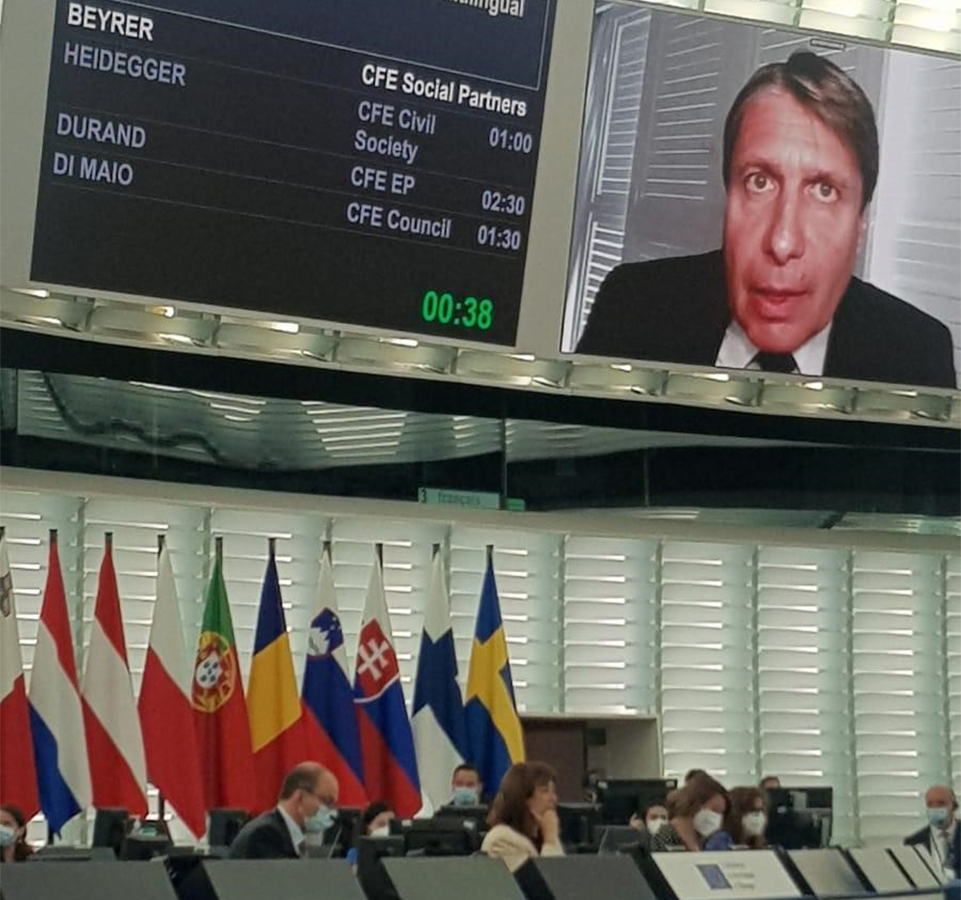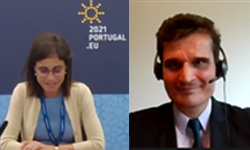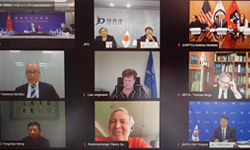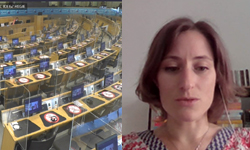BusinessEurope Headlines No. 2021-21
Inaugural plenary: DG Beyrer presents business expectations on the future of Europe

At the inaugural plenary of the Conference on the Future of Europe on 19 June, BusinessEurope Director General Markus J. Beyrer laid out our expectations for this exercise. He argued that if we want to maintain our cherished European way of life, we need to be economically successful. Healthy and flourishing companies are the foundation for our global attractiveness. And it is the prerequisite to be able to pursue our societal, environmental, or social objectives.
BusinessEurope and its members support this conference and its aim of listening to European citizens. We are however still uncertain about the process leading to the adoption of recommendations, and the political purpose of the recommendations. We have warned of them becoming a sort of new European Commission Work Programme. The von der Leyen Commission has established a work programme which has been democratically adopted by EU leaders and the European Parliament.
We also warn of overburdening citizens with expectations that cannot be met. We see a true political danger here: what if many suggestions are legally and politically not feasible? This could back-fire.
BusinessEurope will publish its contribution in the 2nd half of the year.
Contact: Christian Feustel
Video message
Skills for industry
Ahead of the Skills4Industry online event organised by the European Commission, BusinessEurope Director for Social Affairs Maxime Cerutti talks about the impact the ongoing economic transformation, notably towards a greener and more digital Europe, will have on skills needs, jobs and the workforce.
Towards an ambitious agreement with New Zealand
 On 22 June, BusinessEurope Director General Markus J. Beyrer met with the Minister of Trade and Export Growth of New Zealand, Damien O’Connor. “Ambitious market access for services and public procurement at sub-central level, a robust chapter on intellectual property rights that includes extension of patent period, and protection of geographical indications are key elements for business’ support to an agreement with New Zealand”, Beyrer said. European companies look forward to good progress in negotiations and to the manifold opportunities a deal with New Zealand could open up, including in the field of sustainable development.
On 22 June, BusinessEurope Director General Markus J. Beyrer met with the Minister of Trade and Export Growth of New Zealand, Damien O’Connor. “Ambitious market access for services and public procurement at sub-central level, a robust chapter on intellectual property rights that includes extension of patent period, and protection of geographical indications are key elements for business’ support to an agreement with New Zealand”, Beyrer said. European companies look forward to good progress in negotiations and to the manifold opportunities a deal with New Zealand could open up, including in the field of sustainable development.
Contact: Eleonora Catella
Gearing up coordination of education and training systems structural reforms
 The Pact for Skills implementation needs to be connected to recovery and resilience plans implementation. Member States need to create incentives to encourage companies to invest in their workforce skills. The particular needs of small and medium sized enterprises should be addressed. These incentives need to come along and sequenced with improved structural reforms coordination at EU level to support better implementation at national level. The benchlearning approach that applies to apprenticeships needs to be extended to adults’ participation in training. Member States should share information and learn about their respective experiences on improving the role of training funds, structuring a good offer of labour markets relevant training provision, supporting partnerships between business and universities for improved lifelong learning and career guidance. These were the key messages by Maxime Cerutti, Social Affairs Director, at the Portuguese Presidency of the EU Council webinar “Pact4skills in EU industrial ecosystems”.
The Pact for Skills implementation needs to be connected to recovery and resilience plans implementation. Member States need to create incentives to encourage companies to invest in their workforce skills. The particular needs of small and medium sized enterprises should be addressed. These incentives need to come along and sequenced with improved structural reforms coordination at EU level to support better implementation at national level. The benchlearning approach that applies to apprenticeships needs to be extended to adults’ participation in training. Member States should share information and learn about their respective experiences on improving the role of training funds, structuring a good offer of labour markets relevant training provision, supporting partnerships between business and universities for improved lifelong learning and career guidance. These were the key messages by Maxime Cerutti, Social Affairs Director, at the Portuguese Presidency of the EU Council webinar “Pact4skills in EU industrial ecosystems”.
Contact: Robert Plummer
Strengthening IP international cooperation in post-pandemic era
 European, American, Japanese, Korean and Chinese Heads of Intellectual Property (IP5) Offices met with their industry patent users' counterparts (BusinessEurope from the European side) via a virtual conference on 22 June to discuss how the patent system can better respond to the challenges of the post-pandemic era. The IP5 Offices together handle around 85 percent of the world’s patent applications worldwide placing them at the centre of innovation and new emerging technologies. Industry representatives expressed their appreciation for the IP5 Offices’ offices exceptional efforts to keep the patent system functioning during the past 16 months and encouraged continuous exchange of best practices in particular around the use of digitalisation. Industry also reaffirmed their willingness to work with the Offices in these endeavours.
European, American, Japanese, Korean and Chinese Heads of Intellectual Property (IP5) Offices met with their industry patent users' counterparts (BusinessEurope from the European side) via a virtual conference on 22 June to discuss how the patent system can better respond to the challenges of the post-pandemic era. The IP5 Offices together handle around 85 percent of the world’s patent applications worldwide placing them at the centre of innovation and new emerging technologies. Industry representatives expressed their appreciation for the IP5 Offices’ offices exceptional efforts to keep the patent system functioning during the past 16 months and encouraged continuous exchange of best practices in particular around the use of digitalisation. Industry also reaffirmed their willingness to work with the Offices in these endeavours.
Contact: Pedro Oliveira
Five recommendations for a successful review of trade and sustainability
 BusinessEurope Deputy Director Eleonora Catella participated in the hearing “Next Generation Trade and Sustainable Development (TSD) – Reviewing the 15-point action plan” organised by the European Economic and Social Committee on 18 June. In view of the public consultation the European Commission is expected to launch in July, Catella shared five recommendations for the TSD review to deliver: (1) striking a good balance between the economic dimension and the labour/environmental dimensions of TSD chapters; (2) streamlining procedures with clearer procedures, shorter deadlines, provisions on who triggers what with what consequences; (3) focusing on incentivising compliance by trading partners instead of punishing misbehaviour through sanctions; (4) further empowering independent civil society organisations in mandatory joint DAG-to-DAG meetings; (5) complementing provisions of TSD chapters in bilateral agreements with flanking measures in existing and upcoming EU legislative initiatives.
BusinessEurope Deputy Director Eleonora Catella participated in the hearing “Next Generation Trade and Sustainable Development (TSD) – Reviewing the 15-point action plan” organised by the European Economic and Social Committee on 18 June. In view of the public consultation the European Commission is expected to launch in July, Catella shared five recommendations for the TSD review to deliver: (1) striking a good balance between the economic dimension and the labour/environmental dimensions of TSD chapters; (2) streamlining procedures with clearer procedures, shorter deadlines, provisions on who triggers what with what consequences; (3) focusing on incentivising compliance by trading partners instead of punishing misbehaviour through sanctions; (4) further empowering independent civil society organisations in mandatory joint DAG-to-DAG meetings; (5) complementing provisions of TSD chapters in bilateral agreements with flanking measures in existing and upcoming EU legislative initiatives.
Contact: Eleonora Catella
Digital Market’s Act: business views
 “The Digital Markets Act (DMA) has clearly been drawn up with certain services in mind but in reality will apply to many, that is why BusinessEurope wants an efficient dialogue to take place between the European Commission and the gatekeeper on certain obligations before they come into effect”, said Patrick Grant, BusinessEurope Senior Adviser for the Digital Economy at the European Parliament’s DMA public hearing on 21 June. Grant went on to explain that “this dialogue should be entered into in good faith and not be an opportunity for gatekeepers to water down their obligations, it could however be an opportunity for business users to also be consulted to ensure no unintended consequences arise”.
“The Digital Markets Act (DMA) has clearly been drawn up with certain services in mind but in reality will apply to many, that is why BusinessEurope wants an efficient dialogue to take place between the European Commission and the gatekeeper on certain obligations before they come into effect”, said Patrick Grant, BusinessEurope Senior Adviser for the Digital Economy at the European Parliament’s DMA public hearing on 21 June. Grant went on to explain that “this dialogue should be entered into in good faith and not be an opportunity for gatekeepers to water down their obligations, it could however be an opportunity for business users to also be consulted to ensure no unintended consequences arise”.
Contestability and fairness are crucial principles for any healthy market. While the growth of the digital economy has naturally occurred as society moves further online, the success of what is known as “big tech” has also been due to the success of the business users that utilise their services. This in no way means however that big tech is automatically abusing its successful position in certain markets. However, such growth has led to dependency by business users on certain services. We therefore agree that the Digital Markets Act (DMA) should at least ask the question: as to whether contestability and fairness exist where such “gatekeepers” are present.
The DMA continues to be discussed by both co-legislators, the Parliament and the Council. BusinessEurope aims to ensure a future-proof, proportionate and legally certain text as a final outcome. Read more here. See full hearing here.
![]() Contact: Patrick Grant
Contact: Patrick Grant
For an ETS and a CBAM that enable the transformation of our economies
 In a letter by Director General Markus J. Beyrer to European Commission President Ursula Von der Leyen, BusinessEurope expressed its expectations for the upcoming review of the EU’s Emission Trading System (ETS), and the new Carbon Border Adjustment Mechanism (CBAM). The reform must in particular consider potential unintended consequences: especially with a novel, untested and highly complex tool such as CBAM, it is important to keep proven tools, such as free allocation for European ETS participants in place. Beyond that, it is important that the effect of the CBAM on competitiveness and carbon leakage is properly evaluated during a test phase. If designed right, CBAM can be one of a range of tools at the EU’s disposal to address carbon leakage.
In a letter by Director General Markus J. Beyrer to European Commission President Ursula Von der Leyen, BusinessEurope expressed its expectations for the upcoming review of the EU’s Emission Trading System (ETS), and the new Carbon Border Adjustment Mechanism (CBAM). The reform must in particular consider potential unintended consequences: especially with a novel, untested and highly complex tool such as CBAM, it is important to keep proven tools, such as free allocation for European ETS participants in place. Beyond that, it is important that the effect of the CBAM on competitiveness and carbon leakage is properly evaluated during a test phase. If designed right, CBAM can be one of a range of tools at the EU’s disposal to address carbon leakage.
![]() Contact: Steffen Engling
Contact: Steffen Engling
The path for renewable and low-carbon gases in Europe
 “In view of Europe’s energy transition as means to achieve climate neutrality, the discussions on the role of renewable and low carbon gases in an integrated energy mix are extremely important and timely“, reads BusinessEurope’s position on the gas networks consultation. The revision of the Gas Directive and Gas Regulation, which will form part of the hydrogen and decarbonised gas package, will need to align with past and upcoming legislative proposals that will be introduced during coming months.
“In view of Europe’s energy transition as means to achieve climate neutrality, the discussions on the role of renewable and low carbon gases in an integrated energy mix are extremely important and timely“, reads BusinessEurope’s position on the gas networks consultation. The revision of the Gas Directive and Gas Regulation, which will form part of the hydrogen and decarbonised gas package, will need to align with past and upcoming legislative proposals that will be introduced during coming months.
The European gas market revision should optimise the design currently in place and respond to the challenges of the commodity gas in the future.
The way forward must be technology neutral, considering the presence of both renewable and low carbon gases to reach our mid and long-term objectives. Our position paper also points to the main elements for a correct ramp-up of hydrogen production as a key element for the achievement of climate neutrality, as well as the possibility to create a strong industrial value chains in Europe.
![]() Contact: Cecilia Serrano-Piedecasas
Contact: Cecilia Serrano-Piedecasas
Calendar 
- 27 June: Micro-, Small and Medium-sized Enterprises Day
- 29-30 June: Skills for Industry
Not yet a subscriber? Register here.
Reminder: please have a look at our privacy policy